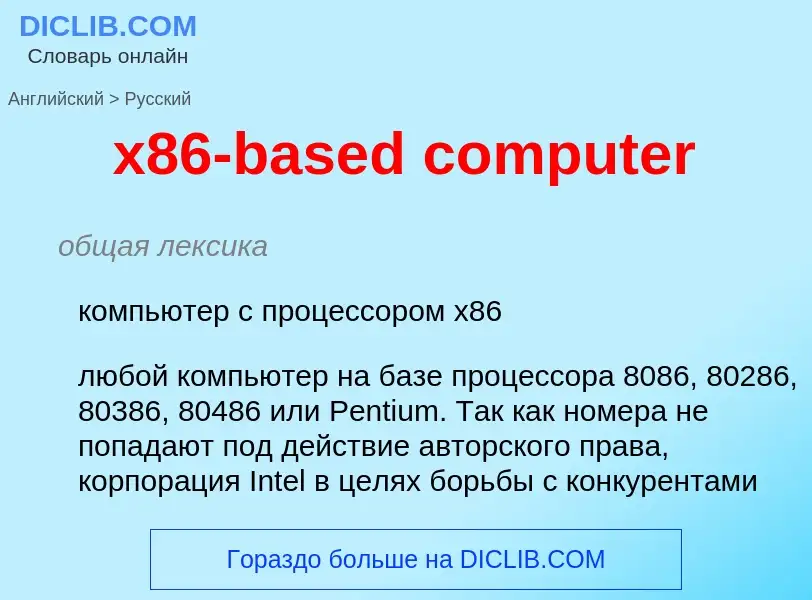Перевод и анализ слов искусственным интеллектом ChatGPT
На этой странице Вы можете получить подробный анализ слова или словосочетания, произведенный с помощью лучшей на сегодняшний день технологии искусственного интеллекта:
- как употребляется слово
- частота употребления
- используется оно чаще в устной или письменной речи
- варианты перевода слова
- примеры употребления (несколько фраз с переводом)
- этимология
x86-based computer - перевод на Английский
общая лексика
компьютер с процессором x86
любой компьютер на базе процессора 8086, 80286, 80386, 80486 или Pentium. Так как номера не попадают под действие авторского права, корпорация Intel в целях борьбы с конкурентами стала давать своим процессорам имена
Смотрите также
общая лексика
семейство x86, семейство 80x86
обобщённое обозначение процессоров фирмы Intel (x 1, ..., 5 и может отсутствовать для 8086). К ним относятся процессоры 086, 186, 286, 386, 486, Pentium, Pentium Pro, Pentium II
синоним
Определение
Википедия
Electronic assessment, also known as digital assessment, e-assessment, online assessment or computer-based assessment, is the use of information technology in assessment such as educational assessment, health assessment, psychiatric assessment, and psychological assessment. This covers a wide range of activities ranging from the use of a word processor for assignments to on-screen testing. Specific types of e-assessment include multiple choice, online/electronic submission, computerized adaptive testing such as the Frankfurt Adaptive Concentration Test, and computerized classification testing.
Different types of online assessments contain elements of one or more of the following components, depending on the assessment's purpose: formative, summative and diagnostic.: 80–82 Instant and detailed feedback may (or may not) be enabled.
In formative assessment, often defined as 'assessment for learning', digital tools are increasingly being adopted by schools, higher education institutions and professional associations to measure where students are in their skills or knowledge. This can make it easier to provide tailored feedback, interventions or action plans to improve learning and attainment. Gamification is one type of digital assessment tool that can engage students in a different way whilst gathering data that teachers can use to gain insight.
In summative assessment, which could be described as 'assessment of learning', exam boards and awarding organisations delivering high-stakes exams often find the journey from paper-based exam assessment to fully digital assessment a long one. Practical considerations such as having the necessary IT hardware to enable large numbers of student to sit an electronic examination at the same time, as well as the need to ensure a stringent level of security (for example, see: Academic dishonesty) are among the concerns that need to resolved to accomplish this transition.
E-marking is one way that many exam assessment and awarding bodies, such as Cambridge International Examinations, are utilizing innovations in technology to expedite the marking of examinations. In some cases, e-marking can be combined with electronic examinations, whilst in other cases students will still hand-write their exam responses on paper scripts which are then scanned and uploaded to an e-marking system for examiners to mark on-screen.


![[[Am386]], released by AMD in 1991 [[Am386]], released by AMD in 1991](https://commons.wikimedia.org/wiki/Special:FilePath/Am386SXL-25cropped.jpg?width=200)


